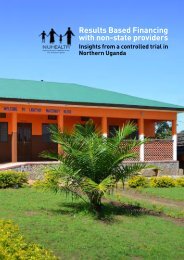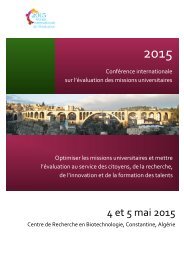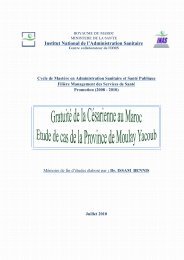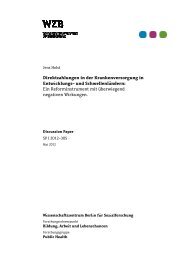Bellagio-Report-Vs-Apr-14
Bellagio-Report-Vs-Apr-14
Bellagio-Report-Vs-Apr-14
You also want an ePaper? Increase the reach of your titles
YUMPU automatically turns print PDFs into web optimized ePapers that Google loves.
AFRICA ROOTED EVALUATION FORDEVELOPMENT: THE CORE CONCEPTWHAT IS “AFRICA ROOTEDEVALUATION”?Evaluation theory and practice have largelyevolved from Western worldviews,perspectives, values and experiences. Over thepast decade, in several parts of the world suchas among the New Zealand Maori, people fromHawai’i, First Nations in the USA and Canada,and most recently in some parts of Asia,evaluators have started to explore new ways ofthinkingEvaluation theory andpractice have largelyevolved from Westernworldviews, perspectives,values and experiencesabout,defining,framingand doingevaluation.Althoughthere isgreatdiversity inAfrica, there are many common threads thathighlight the potential for departure fromWestern perspectives – notions of the individualversus the collective; the power distance insocietal hierarchies; and understanding ofcausality and the control of outcomes.“Indigenization” is a term used to describe “theblending of an imported discipline with thegeneration of new concepts and approachesfrom within a culture” (Adair et al, 2001). Todate most efforts to “Africanize” evaluationhave been modifications of Northern rooted anddriven practices. If evaluation is truly “Africarooted”,conceptual frameworks will emanatefrom the religion, cultural traditions, norms,language, metaphors, knowledge systems,community stories, legends and folklore, socialproblems, social change, public policies, etc. ofthe culture, rather than from some universalisticor “developed world literature” (Adair et al,1993, quoted by Chilisa and Malunga).The concept of Africa rooted evaluation stillneeds careful definition. But initial efforts to doso thus refer to evaluation theory and practicethat is grounded in African philosophicalassumptions about the nature of reality, drawingfrom African perceptions of the nature of being(“I am because we are”), from Africanworldviews and belief systems and ways ofknowing, and informed by Africans’ evolvingvalues and aspirations.The “Africanization of evaluation” from thisperspective therefore refers to a process ofplacing African philosophy, worldviews,knowledge systems and values at the center ofthe evaluation process.As pointed out by Chilisa and Malunga, threecategories of African philosophy are evolvingwith distinct epistemological assumptions(Kaphagawani, 2000) from which Africa rootedevaluation can draw: (i) ethno-philosophywhich emphasizes knowledge as theexperiences of people encoded in theirlanguage, folklore, stories, everydayexperiences, songs, culture and values, and theimportance of teamwork, cooperation,collectiveness, community spirit, and consensusbuilding; (ii) philosophic sagacity emphasizesthe role of sages in the construction ofknowledge; (iii) nationalistic-ideologicalphilosophy that comprises concepts such as theAfrican renaissance and Africanization.A first tentative effort was made by Chilisa andMalunga to propose an Africa RootedEvaluation Tree with (as a start) two branches:(i) a ‘decolonizing and indigenizing evaluationbranch’ to recognize the adaptation of theaccumulated Western theory and practice onevaluation to serve the needs of Africans; and(ii) a ‘relational evaluation branch’ that drawsfrom the concept of ‘wellness’ as personified inAfrican greetings and the southern Africanconcept of “I am because we are”. The wellnessreflected in the relationship between peopleextends also to non-living things, emphasizingthat evaluation from an African perspectiveshould include a holistic approach that links anintervention to the sustainability of theecosystem and environment around it.Evaluation in Africa will therefore focus on thecontributions of development to the wellbeingof individuals, their relatives and others around,as well as of non-living things. There is an interdependencebetween the individual, thecommunity and what surrounds them that have12








